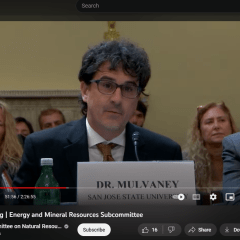Mulvaney on why climate advocates have hesitated to criticize Uyghur genocide
Dustin Mulvaney was featured in a November 2023 story by Nithin Coca in Coda exploring the question: “Why are climate skeptics speaking out about the Uyghur genocide?” According to Coda, they published this article because “China’s control of the solar industry causes tension between respecting a people’s fundamental rights and addressing the crisis of climate change. This story explores how partisan politics, when injected into the mix, drags the issue into ethical quicksand.” Dustin Mulvaney is quoted on topics of why might environmentalists not be addressing the issue. The following quotes are excerpts from the article, and the full version can be found here.
“Together, the U.S. and China are responsible for more than a quarter of greenhouse gas emissions worldwide, and both countries need to take action to reduce their dependence on fossil fuels, as Newsom argued on his trip. One technology that most scientists agree will make a meaningful difference for the climate is solar panels. U.S. appetite for photovoltaics is growing, and although it’s the world’s biggest polluter, China happens to dominate the global supply chain for solar panels: Chinese companies manufacture panels more efficiently and at greater scale than suppliers in other countries, and they sell them at rock-bottom prices.”
“But there’s a big problem at the start of the supply chain. Part of what makes China’s solar industry so prolific is that it is rooted in China’s Xinjiang province, home to a vast system of forced labor in detention camps and prisons where an estimated 1-2 million ethnic Uyghurs and members of other ethnic minority groups are held against their will. There is strong evidence that Uyghurs in Xinjiang live in conditions akin to slavery. Key components of solar energy, in other words, are being brought to much of the world by the victims of what U.S. authorities call an ongoing genocide.”
“None of this material officially lands in the U.S., owing to the 2022 Uyghur Forced Labor Prevention Act, a federal regulation that restricts imports of any goods from Xinjiang — the only law of its kind among the world’s biggest economies. Still, the topic of solar panel production — a critical weapon in today’s arsenal of climate action — is intrinsically tangled up with Uyghur forced labor.”
…
“Seaver Wang is a climate director at the California-based Breakthrough Institute, which published another report on the connections between Xinjiang and solar energy last year. Wang hoped the wave of research on the issue would be a wake-up call for the industry and for climate and energy nonprofits. But the reaction has been mixed at best. “Labor and some industry groups were very eager to talk about the issue,” he said. “But other constituencies, like solar developers and areas of the climate advocacy movement, who are really prioritizing deployment and affordability, didn’t want to rock the boat.””
“Indeed, major environmentalists and climate groups have said little about the origins of so much of the world’s solar energy technology, possibly out of fear of inadvertently harming the expansion of clean energy.”
…
“Dustin Mulvaney, a professor of environmental studies at California’s San José State University, has a theory about why so many climate advocates and groups hesitate to speak on Uyghur forced labor. “It’s an area that people are uncomfortable talking about because they fear it undermines the objectives of getting more solar,” said Mulvaney. “It’s almost as if people are concerned that any information about solar that could be interpreted as a negative could be amplified through the same networks that are doing climate disinformation.””
…
“Early reports about China’s crackdown on ethnic Uyghurs, including the detention of thousands of people as part of a massive “political reeducation” program, emerged in 2017. Dustin Mulvaney, the environmental studies professor, thinks that would have been the optimal time to act. “Had the industry had that traceability in place back then, had they had this conversation back then, they might not find themselves in this situation today,” he said.”
"But now, six years later, both the climate and the Uyghur human rights crisis have worsened. Implicit in the silence from many climate and environmentalists is the idea that, in order to address climate change, the Uyghur cause may have to be sacrificed. Mulvaney feels that environmental advocates have hesitated to criticize solar or bring up forced labor issues for fear of playing into anti-solar messaging.”
“Mulvaney has personally experienced this, seeing his critiques being misquoted in right-wing media. “But I don’t think it works that way. I think people are a little too guarded in protecting solar from criticism.””

